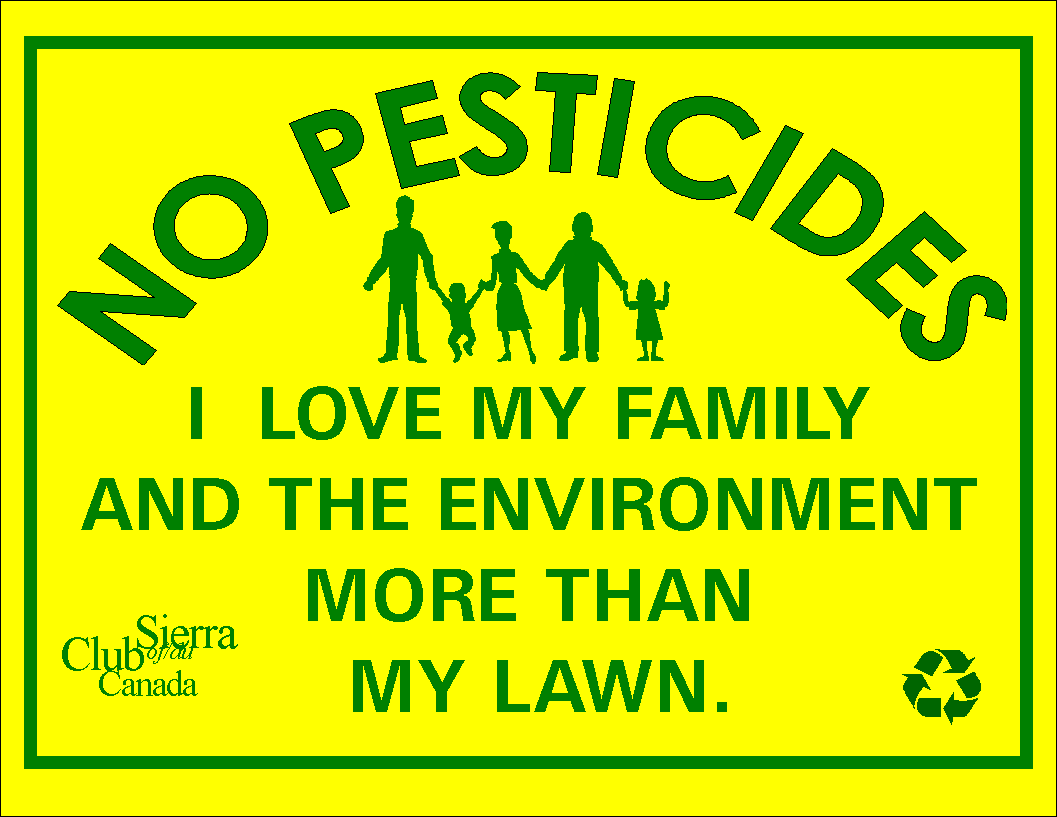
Copyright C. Eaton, RATE

Copyright C. Eaton,
RATE
Health Canada - Healthy Lawns Website
Sierra Club of Canada - Pesticides and Toxics
Sierra Club Report: Children's Health at Risk from Pesticide Exposures
Real Alternatives to Toxins in the Environment Congratulations Halifax on your pesticide bylaw!
Abstract of article from the Journal of the National Cancer Institute
BanDursban.org DURSBAN BANNED! On June 8, 2000, the U.S. Environmental Protection Agency banned virtually all home uses of Dursban. Canada banned Dursban within 24hrs. See news release at CBC Newsworld
Lawn chemicals are poisonous, carcinogenic, and suspected of contributing to many health problems from Lou Gehrig's disease to Multiple Sclerosis to Multiple Chemical Sensitivity. They affect children and pets to an even greater extent because they are in closer contact with the grass, toys and soil that contain pesticide residues. Children also take in more food, air and water per unit of body weight than do adults so this can increase the amount of pesticide absorbed into their bodies. This does not require a Phd to figure out, yet many people spray pesticides as if they were benign. The worst offenders in my opinion are the lawn-care companies who convince their customers to sign up for the full chemical cocktail to treat against every possible weed and insect whether it is present or not. Every year people in my neighbourhood spray their lawns to kill cinch bugs. Did anyone actually see a cinch bug on their lawn? NO! But why not lace the entire property with lethal poison just to make sure. I have never sprayed in the six years I have owned a house (except for the time the lawn-care company sprayed my property instead of the house next door), and I do not have a cinch bug problem. It is a fabricated notion designed to create more business for these companies.
 The National Cancer Institute
has found a 6.5 times greater chance of childhood leukemia in families whose
property is sprayed with pesticides. Also, there is a much greater incidence of
lymphoma in dogs that live on sprayed properties. People are ready to wave
protest signs and attend public meetings when the government wants to
incinerate PCBs fifty kilometres from their house, yet they often ignore the
dangers they create by spraying even more dangerous pesticides in higher
concentrations in close proximity to their house and family.
The National Cancer Institute
has found a 6.5 times greater chance of childhood leukemia in families whose
property is sprayed with pesticides. Also, there is a much greater incidence of
lymphoma in dogs that live on sprayed properties. People are ready to wave
protest signs and attend public meetings when the government wants to
incinerate PCBs fifty kilometres from their house, yet they often ignore the
dangers they create by spraying even more dangerous pesticides in higher
concentrations in close proximity to their house and family.
I do not want to condemn everyone who has used a spray on their lawn; I just want people to realize that these are potentially dangerous chemicals. If you choose to use chemicals, use the minimum required amount and treat only those areas that require it- and only when they require it.
What can an individual do to help reverse the trend toward toxic lawns? Write letters! Although I am just beginning my personal campaign, I have made several phone calls to lawn-care companies that did not place adequate warning signs as well as reporting this to the provincial Dept. of Environment. I have written a letters to one of the companies, the provincial minister of environment and also a letter to the editor of the city newspaper. I will soon be sending letters to the municipal government as well. Click on this link if you would like to read copies of the letters I have sent so far: